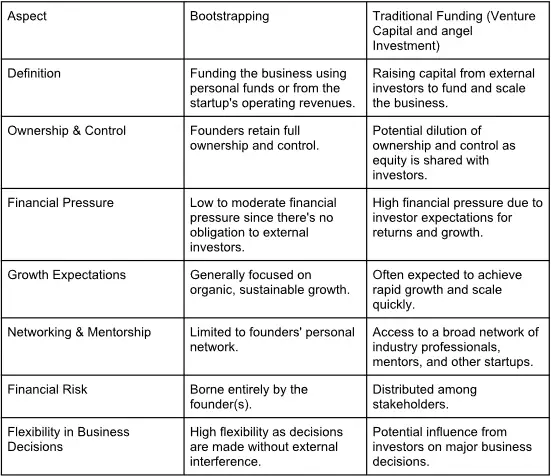Bootstrap Brilliance: Crafting Success from Scratch
In the ever-evolving landscape of the Indian startup ecosystem, various funding options have emerged, with one particularly intriguing model standing out: the bootstrapped startup.
But what exactly is a bootstrapped startup? Dive in as we explore this unique approach to business that many Indian entrepreneurs are increasingly adopting.
Defining Bootstrapped Startups
A bootstrapped startup is essentially a business birthed and nurtured without leaning on external financial support. Rather than turning to venture capitalists, angel backers, or hefty bank loans, the brave founders behind these startups dig into their own pockets or harness the company's early earnings to keep the wheels turning.
Explaining you how it is different from Private LTD and LLP startup.
Operating without external funds comes with its own set of challenges and advantages. One of the primary challenges is the constant pressure of managing expenses while ensuring steady growth. However, the advantage is the full control founders retain over their business, free from the external pressures and obligations that often come with external investments.
Key Characteristics of Bootstrapped Startups
Limited Resources:
Yet, it's often said that constraints breed creativity. With limited financial muscle, these ventures are compelled to think outside the box, innovating and discovering unique solutions to challenges that money alone can't solve.
Self-reliance:
Bootstrapped startups are characterized by a profound sense of self-reliance. Founders are deeply involved in all facets of their venture, from ideation and product creation to marketing and sales. This hands-on approach ensures alignment with the founder's vision at every step.
Organic Growth:
Unlike businesses backed by investor funds aiming for explosive growth, bootstrapped startups often champion organic growth. This means they grow at a rate proportionate to their revenues, ensuring longevity and sustained profitability.
Full Control:
Without external investors to answer to, founders maintain complete control over their business decisions. This autonomy can be empowering, allowing for a business vision to be executed without external interference.
Pros and Cons
- Retain Full Ownership: Going the bootstrapped route means you're the captain of your own ship. Founders hold onto every share of their company, ensuring their hard work directly benefits them.
- Creative Control: When you're not answering to external financiers, there's room to breathe, dream, and craft the business in line with your original vision.
- Less Dependency on External Investors: You're not constantly looking over your shoulder or waiting for approval. Decisions are made swiftly, based on what's best for the business.
- Focus on Sustainable Growth: Free from the weight of external investor demands, bootstrapped startups often go on a business journey that emphasizes enduring growth rather than fleeting victories.
- Reduced Debt and Equity Dilution: Steering clear of loans and equity handouts ensures the startup stays clear of debt traps and preserves the founder's share value.
- Limited Initial Resources: You start with what you have, and sometimes, it might feel like you're bringing a knife to a gunfight.
- Slower Growth Trajectory: Without a cash influx from investors, scaling up might take longer than you'd like.
- Risk of Missed Opportunities: Financial constraints might mean passing up on potentially lucrative ventures or partnerships.
- Financial Constraints: Cash flow becomes a constant game of balance, and sometimes, tough decisions need to be made to keep the lights on.
- Higher Risk of Failure in Competitive Markets: In industries where big players dominate, bootstrapped startups might find it hard to carve out a niche without significant capital.
Bootstrapping Vs Traditional Funding
Conclusion:
Bootstrapped startups offer a refreshing perspective in the bustling world of entrepreneurship. These ventures, fueled by personal savings and the early revenues they generate, stand as a testament to self-reliance and innovation. The journey, though challenging, has its unique rewards.
Here are the key takeaways:
- Ownership and Control: Bootstrapping allows founders to retain full ownership, ensuring that the direction and vision of the startup remain uncompromised.
- Resourcefulness: Limited resources often lead to creative solutions, pushing the startup to innovate and pivot as needed.
- Sustainable Growth: Without the pressure from external investors, bootstrapped startups can focus on organic growth, ensuring a strong foundation for the future.
It's essential to underscore the sheer determination, adaptability, and commitment required when bootstrapping. It is not just about financial independence; Bootstrapping is about creating a path that prioritizes sustainable growth and aligns closely with the founder's vision. For those willing to navigate its challenges, bootstrapping can be a fulfilling journey, epitomizing the essence of entrepreneurship.
Starting the bootstrapped journey can be challenging, but you don't have to do it alone. At TheStartupLab.in, we understand the grit and determination it takes. Dive into our resources, connect with like-minded entrepreneurs, and let's chart a path to sustainable growth together. Because every great startup story deserves the right support.

